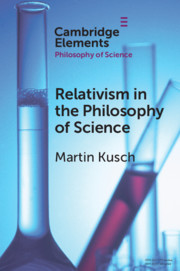Refine search
Actions for selected content:
2 results
13 - Thomas Kuhn and the Strong Programme
- from Part IV - Kuhn’s Impact on the Philosophy, Sociology, and History of Science
-
-
- Book:
- Kuhn's <i>The Structure of Scientific Revolutions</i> at 60
- Published online:
- 05 January 2024
- Print publication:
- 18 January 2024, pp 235-253
-
- Chapter
- Export citation

Relativism in the Philosophy of Science
-
- Published online:
- 19 December 2020
- Print publication:
- 28 January 2021
-
- Element
- Export citation
